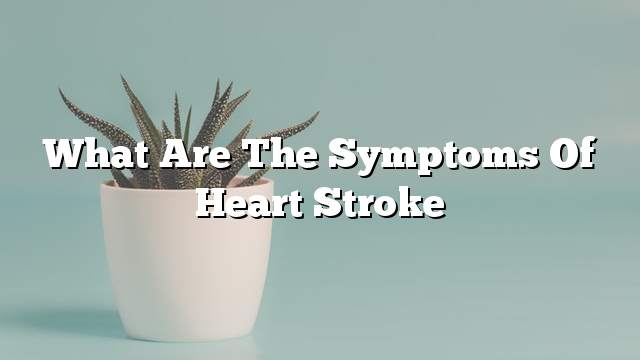heart attack
The heart, like the rest of the body’s muscles, needs a constant amount of oxygen and nutrients to reach it through two main artery arteries. If there is a blockage in one or both of the arteries, the supply of oxygen and nutrients will be reduced in a part of the heart. Heart failure (or heart ischemia).
This blockage usually occurs due to the accumulation of fat and cholesterol and therefore the thrombus forms in these arteries. If this condition continues for a long time, the heart tissue, which is known as a heart attack, will die.
There are also other causes of heart stroke, such as coronary artery thrombosis and thus stopping blood supply to the heart, as smoking and drug abuse such as cocaine can lead to this condition. The cause of the stroke is also an automatic rupture in one of the coronary arteries.
Symptoms of heart stroke
Symptoms of heart attack vary, as each patient experiences symptoms different from the other, yet the diagnosis depends primarily on them. These symptoms include:
- Chest pain: It is usually described as a feeling of pressure or fullness or an age in the middle part of the chest. It is possible that the patient will feel the pain move to the jaw, teeth, shoulder, arm or back.
- Feeling choking or shortness of breath.
- Pain in the area above the stomach with or without feeling nausea or vomiting, or feeling indigestion.
- Increased sweating.
- Fainting without another reason for him.
- Feeling anxious.
- Cough.
- Accelerating and irregular heartbeat.
- Cognitive disorder without another cause.
During a heart attack, symptoms persist for 30 minutes or more, and the patient does not improve with rest or oral medications. These symptoms begin as a mild irritating sensation in the chest that develops into severe pain. It is possible to have a heart attack in a person without symptoms, especially if he suffers from diabetes, which is called silent heart stroke.
Factors that increase the chances of heart attack
Certain factors contribute to the formation of clotting and the accumulation of fat in the coronary arteries, causing constriction. Most of these factors can be avoided, thus reducing the chances of heart attacks. These factors include:
Complications of heart stroke
Cardiac complications are caused by damage to the heart tissue. These complications include:
- Heartbeat disorder : In the occurrence of damage to the heart tissue forming abnormal electrical circuits in the damaged tissue, which in turn affect the electrical conduction of the heart, disrupting the normal rhythm of the heart beat, and these disorders are serious and may lead to death.
- Heart failure : Heart failure occurs if the affected part of the heart attack is large and unable to pump enough blood, and this failure either temporarily disappears after the recovery of the heart or always.
- Heart tissue rupture : Damaged tissue from the heart is more susceptible to rupture.
- Heart valve dysfunction .
Treatment of heart stroke
Early treatment for heart attack is very important, as permanent damage to the heart tissue is prevented or at least limited. First, contact the ambulance immediately after the onset of the first symptoms. Treatment can be divided into:
- Medications : Those given at the onset of a stroke even before the diagnosis is confirmed. These drugs include: Aspirin to prevent the formation of other clotting, and nitroglycerin to reduce the effort from the heart and to improve blood flow through the coronary arteries, oxygen, and also give painkillers to relieve chest pain.
- Drugs for thrombosis : A drug that works to dissolve and destroy clotting causes of blockage of the coronary arteries, and in order to work these drugs to the best must be given within a few hours of the onset of symptoms or to be given as soon as possible.
- Coronary artery bypass surgery : A non-surgical intervention involving the insertion of a catheter tube through a blood vessel (usually in the hip) and its delivery to the blocked heart artery to open it.
- Other treatments : Include many cardiac drugs and surgeries; such as beta-inhibitors, lipid-lowering drugs (statins) and coronary artery bypass surgery.
Healthy habits of the heart
The treatment of heart attack includes healthy habits that the patient should follow to reduce the chances of stroke again, and these habits:
- Healthy eating of the heart : Includes low or skimmed products, fish rich in omega-3 fats, integrated vegetables, fruits and legumes, as well as foods containing saturated fat, red meat, palm oil, coconut, sugary foods and beverages.
- Maintain ideal health weight .
- Stress control : One study has shown that the biggest stimulant of heart stroke is stress. In addition, some people may resort to nervous habits such as smoking, drinking alcohol, or eating too much, which makes it worse.
- Exercise : Helps to get rid of many of the risk factors leading to heart attack, such as high fat levels, high blood pressure and weight gain.
- Quit Smoking .
